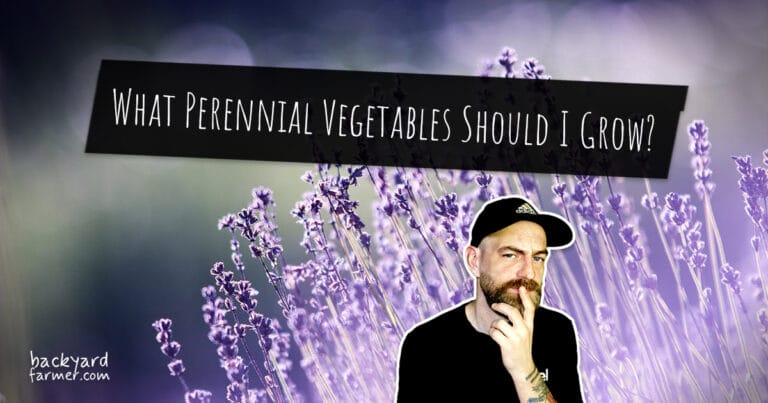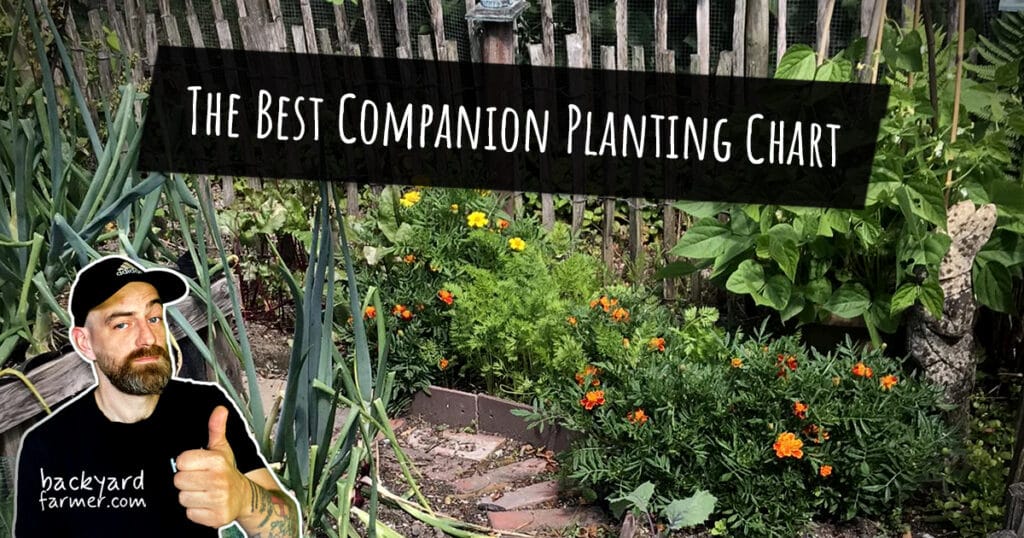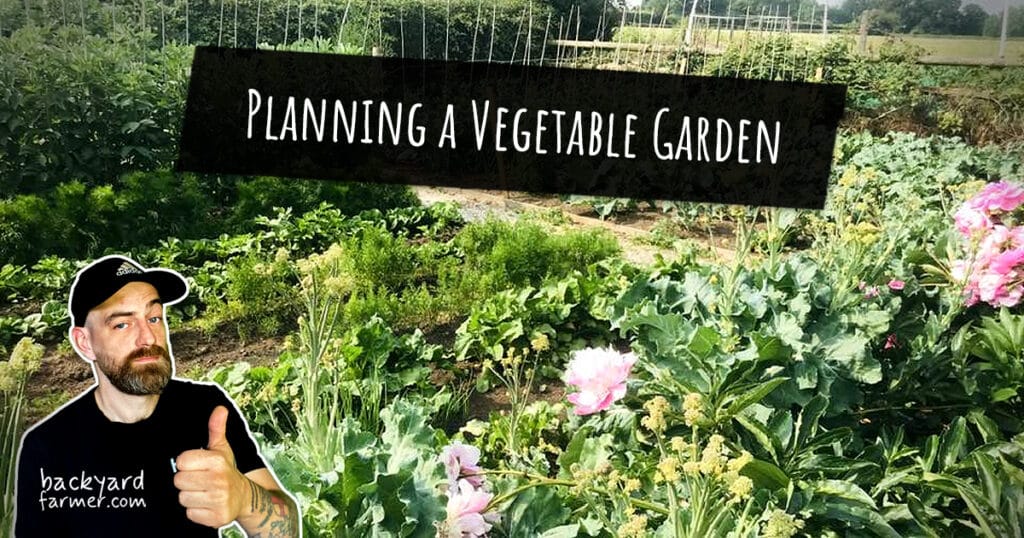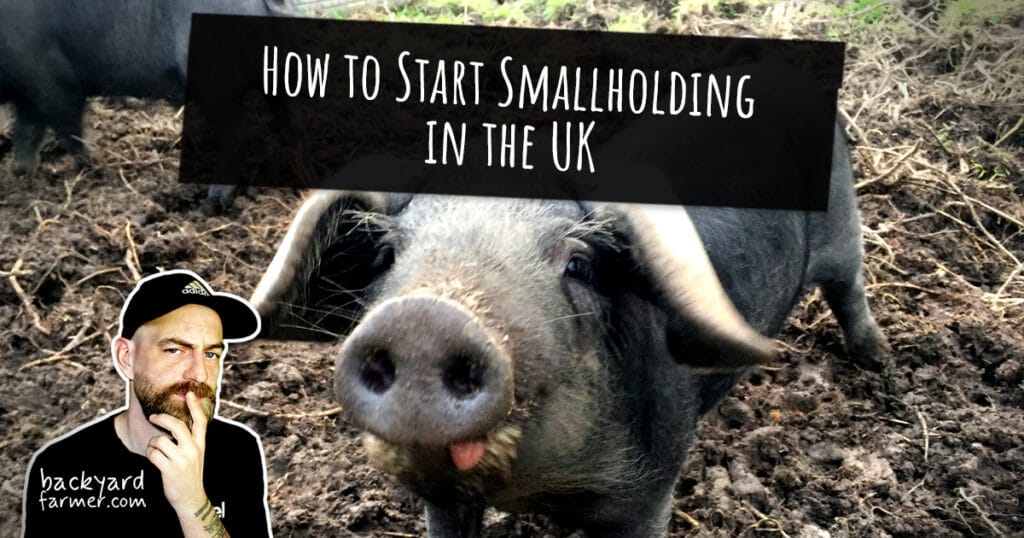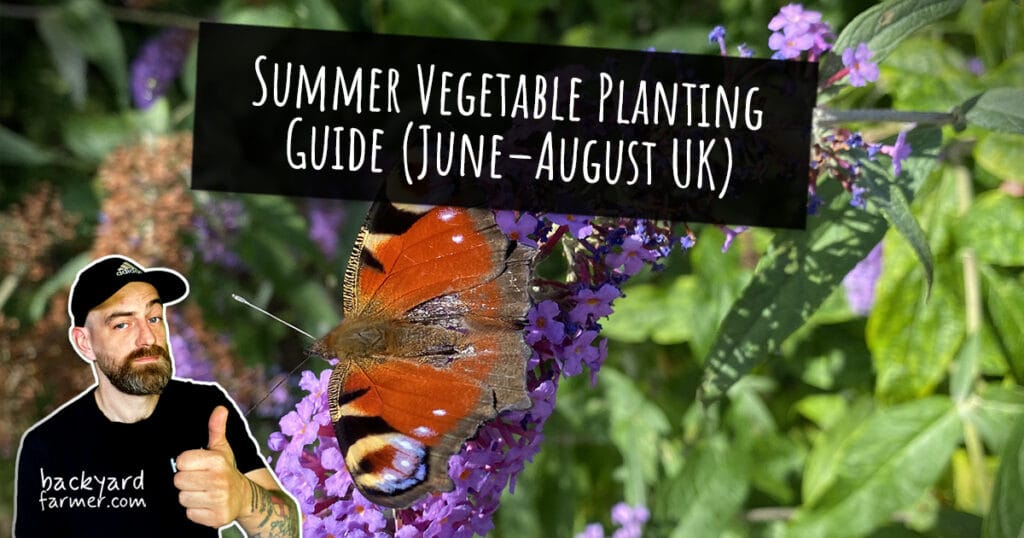Introduction: What Perennial Vegetables Should I Grow in the UK?
Looking to grow more food without doubling your effort? Perennial vegetables are one of the best ways to build a low-maintenance, self-sufficient garden. Unlike annuals—which need sowing every year—these hardy plants come back year after year. As a result, they help you save time while naturally enriching your soil.
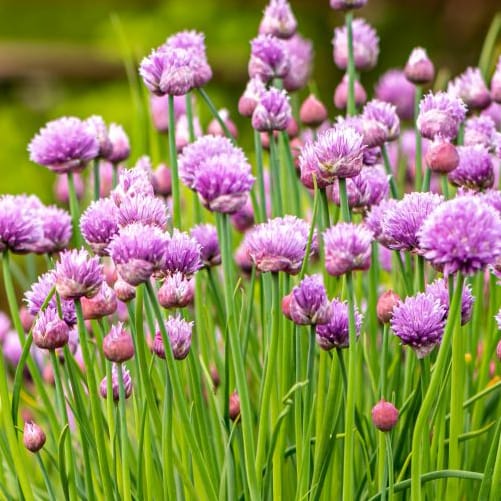
Whether you’re growing a no-dig kitchen patch, experimenting with edible perennials, or planning a full-on food forest, perennial veg can keep your garden productive with less input. In fact, they’re perfect for gardeners who want reliable crops without constant replanting. From reliable UK favourites like asparagus and rhubarb to lesser-known gems like sorrel, sea kale, and Egyptian walking onions, there’s a surprising variety of perennial vegetables that grow in the UK.
In this guide, we’ll explore the best UK perennial vegetables, explain how to grow them, and show you where to find seeds or plants—so you can build a thriving, climate-resilient garden that provides season after season.
Related Reading: Check out our guides on how to grow strawberries at home, using worm castings in the garden, and the best compost bins for UK gardens.
Why Grow Perennial Vegetables in the UK?
Growing perennial vegetables isn’t just about easier harvests—it’s a long-term win for your garden. These low-maintenance vegetables aren’t fussy, and once they’re in, they keep on giving. So, whether you’re aiming for less work, healthier soil, or a more climate-resilient plot, perennial veg are well worth the space.
Here’s why they deserve a permanent spot in your UK garden:
1. Plant Once, Harvest for Years: Vegetables That Grow Back Annually
Perennial vegetables save time and effort. Unlike annual crops that need sowing every year, these plants grow back on their own. Once they’re established, they’ll keep producing—cutting down your seed bill and reducing seasonal prep work. As a result, you get more food for less effort.
2. Improve Soil Health Naturally with Edible Perennials
Deep-rooted perennials feed the soil. Because they reach deeper into the ground, they break up compacted earth, support beneficial microbes, and prevent erosion. In addition, as they shed leaves and die back, they add organic matter—ideal for no-dig gardening or regenerative vegetable gardens.
3. Less Watering, Weeding, and Fuss: Truly Low-Maintenance Vegetables
Low-input growing made easy. Since perennials are typically more drought-tolerant and pest-resistant than annuals, you’ll spend less time watering and weeding. Consequently, they’re perfect for busy growers or those with less-than-perfect conditions. You’ll also save on fertiliser, as many thrive with little to no feeding.
4. Build Biodiversity and Garden Resilience with Perennial Veg
Diverse perennial crops support wildlife and stability. Because they stick around year after year, they offer continuous food and shelter for pollinators and soil organisms. Plus, staggered harvests help spread the risk, increase your food security, and build resilience into your growing system.
5. Perfect for Permaculture and UK Forest Gardens
Perennials are foundational to edible ecosystems. They work beautifully in layered planting systems and combine well with herbs, fruit bushes, and flowers. Whether you’re building a full-on forest garden or just tucking a few into a border, they fit right in and help anchor your design.
Bottom line: From shady patches to heavy clay, there’s a perennial vegetable for nearly every UK garden. So, next, we’ll look at which ones to grow and how to make them thrive.
True Perennial vs Self-Seeding Vegetables in the UK
When planning a perennial vegetable garden, it’s helpful to understand the difference between true perennials and self-seeding annuals or biennials. Both can give you reliable, long-term harvests—but they behave differently, which affects how you plant, manage, and maintain your space.
What is a True Perennial Vegetable? (UK-Friendly Low-Maintenance Crops)
True perennial vegetables come back from the same root system every year. These low-maintenance vegetables keep growing without needing to be replanted. Once established, they’ll continue producing with very little effort.
Examples of true perennial vegetables include:
- Asparagus – Can keep producing for 20+ years from the same crown
- Rhubarb – Hardy, dependable, and one of the earliest crops to harvest
- Sea Kale – Strengthens each year and thrives in coastal or inland soils
- Daubenton Kale – A branching, non-flowering kale that lives for years
These crops form the backbone of any edible perennial garden and thrive in permaculture planting systems.
What Are Self-Seeding or Short-Lived Perennial Vegetables?
Self-seeding vegetables behave like perennials without technically being one. They don’t live forever, but they often:
- Self-seed naturally (like sorrel, wild rocket, and some kale varieties)
- Spread by clumping or offsets (like Egyptian walking onions)
- Act like biennials, returning in milder winters (like chard)
With the right conditions and a bit of support, they’ll keep cropping and fill in the gaps in your perennial foodscape.
Examples of self-seeding perennial vegetables or biennials:
- Kale (Red Russian and similar) – Biennial but often self-sows and regrows
- Three-Cornered Leek – Spreads and naturalises like a true perennial
- Sorrel – Pops up reliably each spring from self-sown seed
Why It Matters for UK Perennial Growers
Understanding the difference helps with garden planning. True perennials give you structure and consistency. Self-seeders offer flexibility and help increase biodiversity. Together, they create a resilient, low-effort, food-producing system—perfect for UK gardens and low-maintenance growing.
Next up: we’ll explore the best perennial vegetables to grow in the UK—from tough staples to tasty self-seeders that earn their spot in your plot.
12 Best Perennial Vegetables for UK Gardens
Here’s a mix of hardy, true perennial vegetables and dependable self-seeding veg that do brilliantly in the UK climate. Whether you’re building a no-dig food garden or adding to an edible perennial landscape, these are some of the best low-maintenance vegetables you can grow. For each plant, you’ll find flavour notes, growing tips, and how they fit into a sustainable setup.
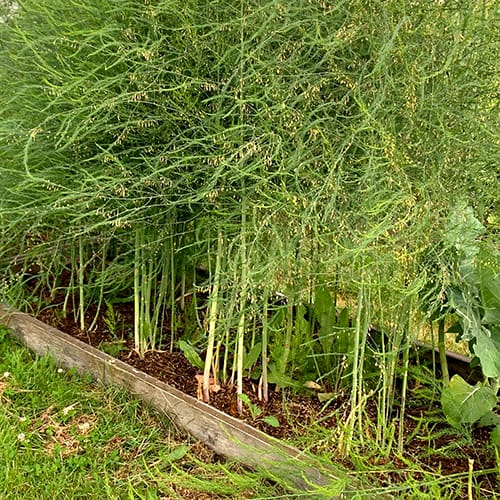
1. Asparagus (Asparagus officinalis)
Perennial lifespan: 20+ years
Taste: Sweet, nutty, savoury
Growing notes: Thrives in full sun and well-drained soil. It takes a couple of years to establish but then crops reliably. Harvest spears in spring. Mulch well in autumn.
Bonus tip: Choose male crowns for heavier yields.
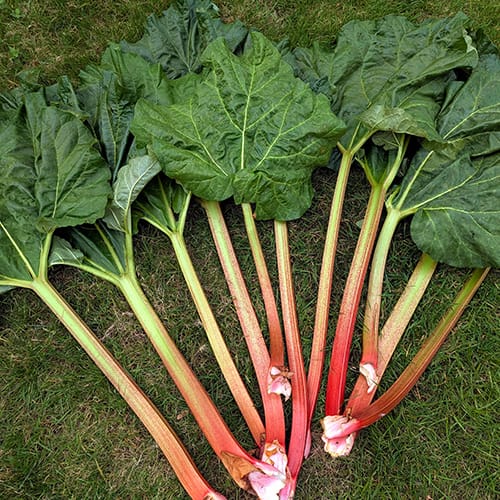
2. Rhubarb (Rheum x hybridum)
Perennial lifespan: 10–15 years
Taste: Tart and fruity—great in both sweet and savoury dishes
Growing notes: Prefers rich, moist soil. Remove flowering stalks and start harvesting in year two.
Bonus tip: Leaves are toxic—stick to the stems.
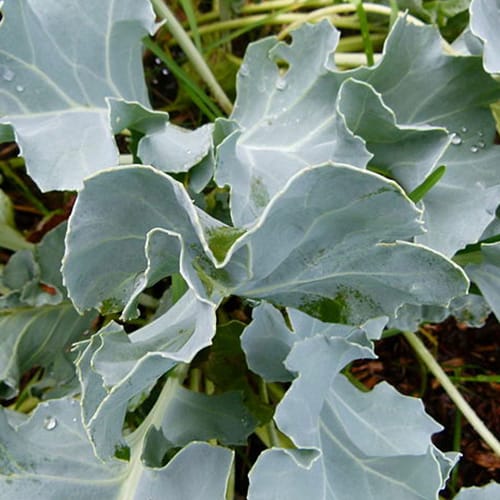
3. Sea Kale (Crambe maritima)
Perennial lifespan: 10+ years
Taste: Nutty and mild—somewhere between asparagus and cabbage
Growing notes: Prefers sandy or free-draining soil. Great for coastal gardens but does well inland too. Blanch spring shoots for gourmet-quality stems.
Bonus tip: Leave some flowers for pollinators and self-seeding.
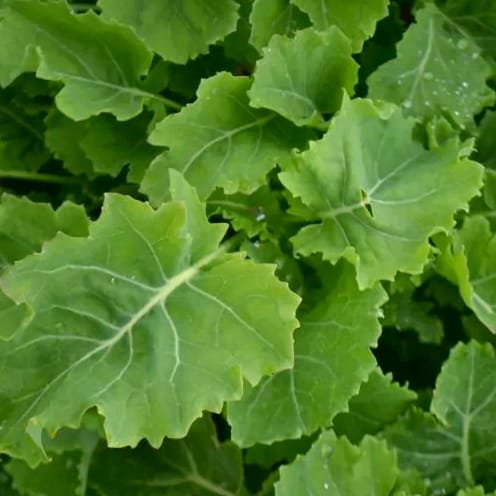
4. Daubenton Kale (Brassica oleracea var. ramosa)
Perennial lifespan: 4–5+ years (longer with propagation)
Taste: Familiar kale flavour with a rich, nutty edge
Growing notes: Non-flowering and extremely hardy. Great for perennial food gardens and borders. Best grown from cuttings.
Bonus tip: Netting helps prevent damage from cabbage whites.
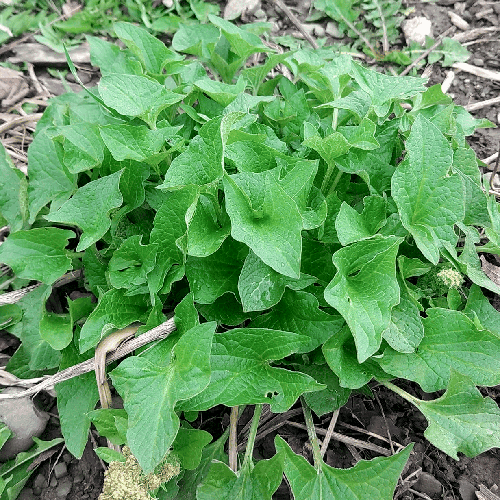
5. Good King Henry (Blitum bonus-henricus)
Perennial lifespan: 5–10 years
Taste: Earthy, spinach-like leaves and edible shoots
Growing notes: Thrives in poor soils and partial shade. It takes a year or two to settle, but then becomes reliable and self-seeds well.
Bonus tip: Pick young leaves—older ones turn bitter.
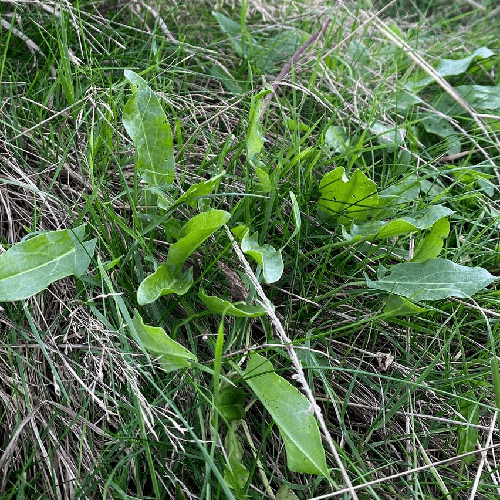
6. Sorrel (Rumex acetosa)
Perennial lifespan: 3–5 years (reseeds easily)
Taste: Zingy and lemony
Growing notes: Tolerates shade and heavy soils. Perfect for UK perennial veg gardens. Pick often to encourage fresh growth.
Bonus tip: Use in soups, sauces, or as a citrusy salad green.
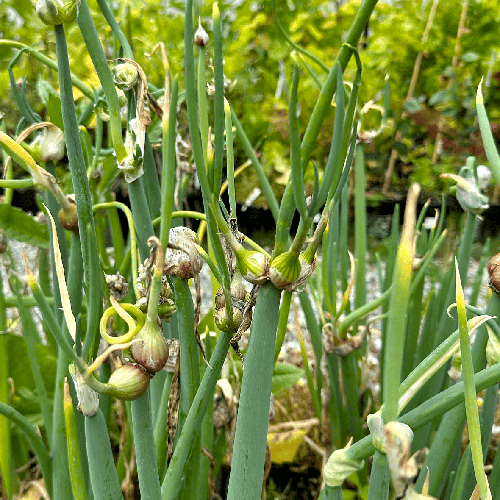
7. Egyptian Walking Onion (Allium × proliferum)
Perennial lifespan: Indefinite—spreads via bulbils
Taste: Onion flavour with a garlicky edge
Growing notes: Very hardy and ideal for low-maintenance perennial planting. The tops form bulbils that “walk” as they root.
Bonus tip: Harvest greens, small bulbs, or top sets year-round.
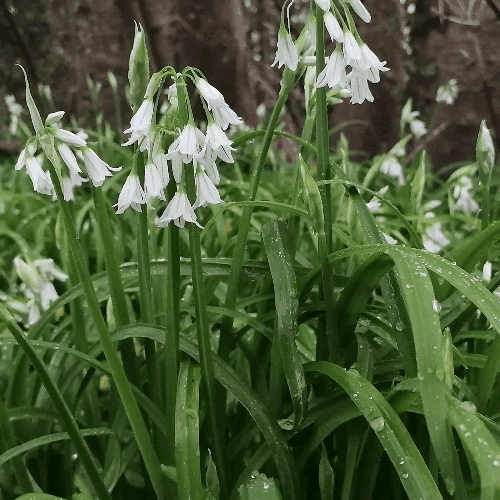
8. Three-Cornered Leek (Allium triquetrum)
Perennial lifespan: Self-spreading perennial
Taste: Mild garlic-onion blend
Growing notes: Prefers damp, shady spots. Naturalises quickly and thrives in woodland-style perennial gardens.
Bonus tip: Cut back regularly to keep it from taking over.
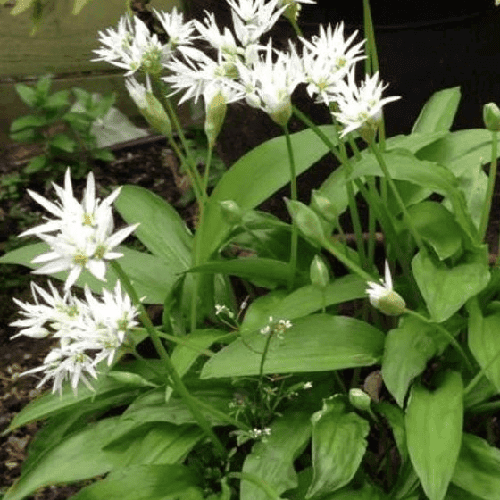
9. Wild Garlic / Ramps (Allium ursinum)
Perennial lifespan: Spreads easily and naturalises well
Taste: Bold garlic flavour—milder when cooked
Growing notes: A great fit for shady, damp areas. Dies back in summer but comes back strong every spring.
Bonus tip: Forage responsibly or grow your own from bulbs or seed.
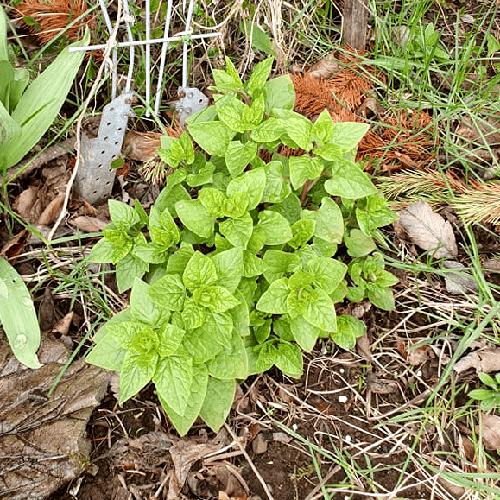
10. Hablitzia (Hablitzia tamnoides / Caucasian spinach)
Perennial lifespan: 10+ years
Taste: Mild spinach taste with early-spring growth
Growing notes: A cold-hardy climbing green for partial or full shade. Great for vertical planting in permaculture gardens.
Bonus tip: Perfect for covering trellises or north-facing fences.
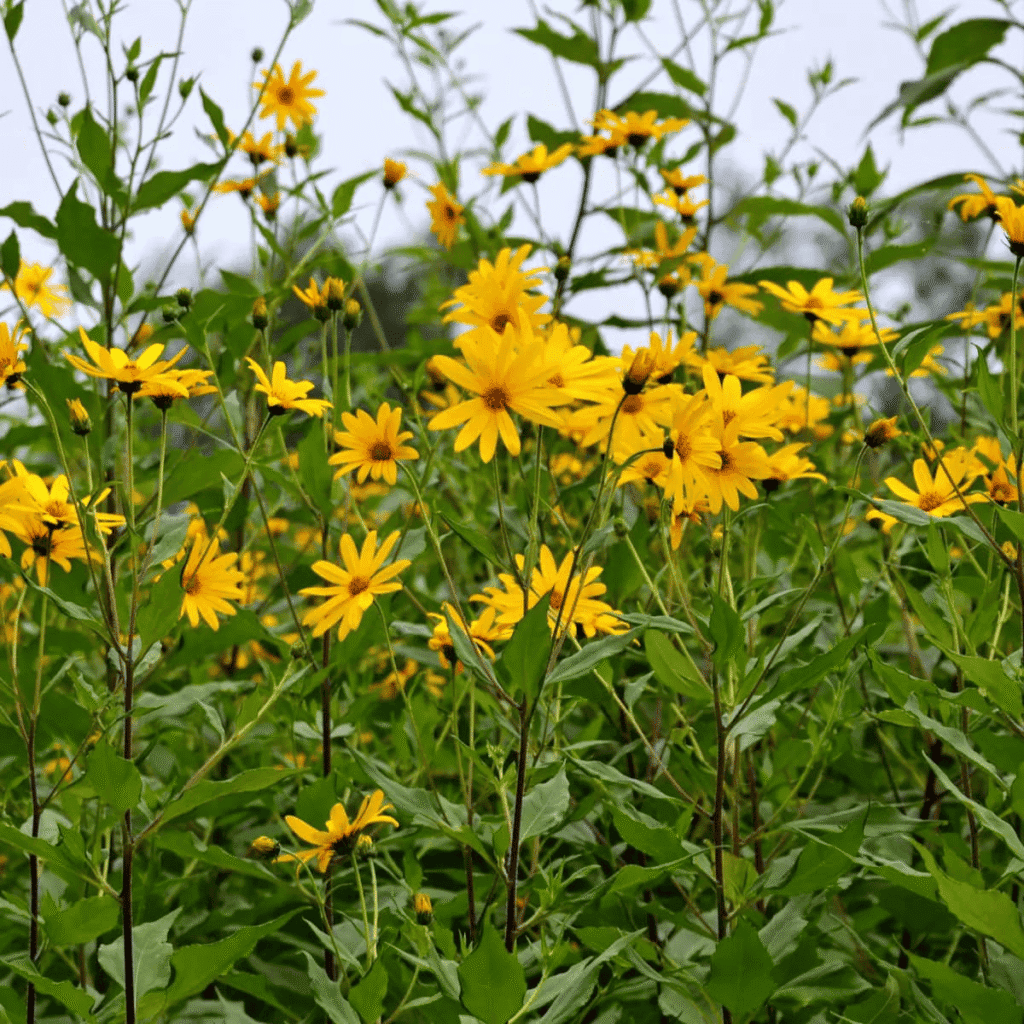
11. Jerusalem Artichoke (Helianthus tuberosus)
Perennial lifespan: Returns yearly from tubers
Taste: Nutty and sweet—similar to water chestnut
Growing notes: Grows tall and spreads easily. Ideal for UK no-dig gardens and wild patches. Harvest after frost.
Bonus tip: Roast for a rich, nutty flavour.
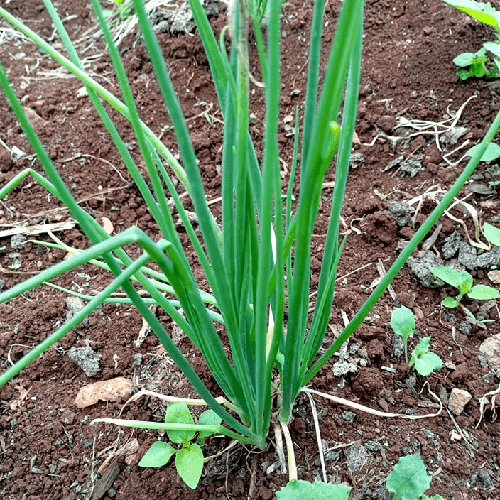
12. Welsh Onion (Allium fistulosum)
Perennial lifespan: Long-lived clumping allium
Taste: Like spring onions
Growing notes: Great in containers or borders. Divide clumps every few years for best productivity. Year-round harvests in mild areas.
Bonus tip: Excellent in soups, stir-fries, and salads.
Next up: Struggling with shade or heavy soil? Let’s look at the best perennial vegetables for tricky garden conditions in the UK.
Perennial Vegetables for Shade or Clay Soil
Let’s face it—most of us aren’t working with perfect garden conditions. But that doesn’t mean you can’t grow a thriving patch. Plenty of perennial vegetables are more than happy in tricky spots like shaded corners, damp edges, or even heavy clay soil—and they’ll keep coming back year after year.
Here are some of the best perennial veg for shady and clay-heavy UK gardens:
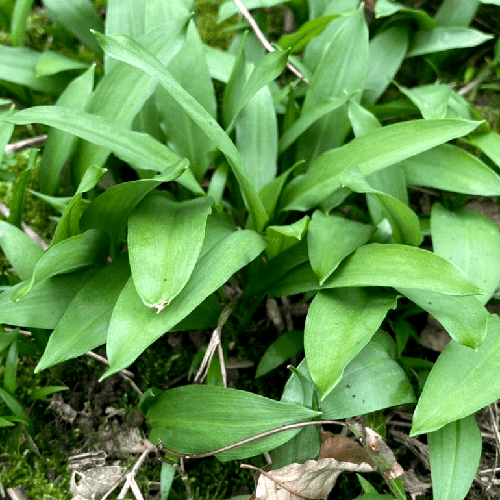
1. Wild Garlic (Allium ursinum)
Best for: Damp, shaded woodland-style areas
Why grow it: Wild garlic thrives in moist shade and will happily spread into a lush, edible carpet. The leaves have a strong garlic flavour, and the white flowers are edible too.
Key takeaway: Ideal for damp, shady spaces where few edibles thrive.

2. Three-Cornered Leek (Allium triquetrum)
Best for: Light shade, neglected corners
Why grow it: This hardy allium handles poor soil well and naturalises quickly. It’s a great option for perennial vegetable gardens in the UK where space or sunlight is limited.
Key takeaway: Perfect for low-light spots and easy to grow.

3. Sorrel (Rumex acetosa)
Best for: Semi-shade or damp, sticky soil
Why grow it: Sorrel is a fantastic low-maintenance vegetable that tolerates heavy, moisture-retaining soils. Its lemony leaves grow well in part shade and often self-seed.
Key takeaway: Tolerates shade and wet conditions with ease.

4. Good King Henry (Blitum bonus-henricus)
Best for: Shady borders or compacted ground
Why grow it: This old-school edible perennial is slow to establish but very reliable. It works well in clay-rich soil near fences, hedges, or tucked into low-light areas.
Key takeaway: A dependable choice for problem patches.

5. Hablitzia (Hablitzia tamnoides)
Best for: North-facing walls, fences, and cool, shady spots
Why grow it: Also known as Caucasian spinach, this climbing perennial vegetable loves shade and will tolerate clay soils with a little compost mixed in. It’s a brilliant early-season green.
Key takeaway: Thrives in cool, low-light areas with vertical support.
Quick Tips for Growing Perennial Vegetables in Tough Conditions
- Add organic matter like compost, leaf mould, or rotted manure to improve drainage and texture.
- Mulch annually to retain moisture and support soil life.
- Use no-dig beds, especially effective for perennial crops.
- Match plants to your microclimate—don’t force sun-lovers into shade.
Next up: Find out where to buy perennial vegetable plants and seeds in the UK—and what to watch out for when shopping online.
Where to Buy Perennial Vegetable Plants & Seeds in the UK
Once you’ve picked out the perennial vegetables you want to grow, the next step is sourcing high-quality seeds or plants. Thankfully, there are several trusted UK suppliers that specialise in edible perennials, heritage varieties, and low-maintenance vegetables ideal for permaculture, no-dig gardens, and perennial foodscapes.
Whether you want crowns, plug plants, or open-pollinated seeds—these UK sources are worth checking out:

1. Suttons Seeds (suttons.co.uk)
What they offer: A well-known UK seed supplier with a growing selection of perennial vegetables, including rhubarb crowns, asparagus, sorrel, and walking onions. Easy to navigate and backed by decades of gardening expertise.
Why choose them: Trusted, beginner-friendly, and perfect for topping up with perennial favourites.

2. Amazon UK (amazon.co.uk)
What they offer: While not as specialised, Amazon carries a decent selection of perennial crowns (like asparagus), plug plants, and seed packs. It’s convenient for topping up your garden or grabbing essentials in a pinch.
Why choose them: Useful for sourcing popular or seasonal perennial veg plants on demand.

3. Real Seeds (realseeds.co.uk)
What they offer: An ethical, UK-based seed company offering heirloom and open-pollinated varieties. They carry perennial leeks, kale, and other lesser-known UK-friendly perennial vegetables suited to low-input growing.
Why choose them: Best for seed-savers and gardeners looking to preserve plant genetics.

4. Incredible Vegetables (incrediblevegetables.co.uk)
What they offer: A Dartmoor-based project focused on climate-resilient crops and regenerative gardening. Their range includes well-rooted perennial tubers, cuttings, and plants—all grown with future-friendly methods.
Why choose them: Ideal for permaculture growers and those building sustainable food systems.
Bonus Tip: When and How to Buy
- Best time to plant: Early spring or autumn, depending on the species.
- Root crops and tubers: Plant while dormant over winter.
- Popular varieties sell out fast: Sign up for restock alerts if your favourites aren’t available.
Next up: We’ll answer the most common questions about growing perennial vegetables—so you can plant with confidence and keep your garden thriving year after year.
FAQ: Perennial Vegetable Questions
New to perennial vegetables? You’re not alone—and the good news is, they’re easier than you might think. Here are answers to some of the most frequently asked questions to help you grow a productive and low-maintenance garden with confidence.
True perennial vegetables like asparagus, rhubarb, sea kale, sorrel, and Good King Henry return from the same roots each season. Others—like Egyptian walking onions and three-cornered leek—spread and naturalise, making them reliable staples in a UK perennial veg garden.
Definitely. Aside from the classics like asparagus and rhubarb, great options include Daubenton kale, wild garlic, Hablitzia (Caucasian spinach), and perennial onions. These are all strong choices for a low-maintenance edible garden in the UK.
Annual vegetables (like tomatoes or lettuce) complete their life cycle in one season—they grow, fruit, and die. Perennial veg, on the other hand, live for multiple years and grow back each spring without the need to replant.
Plenty! The UK climate supports a wide variety of perennial edible plants including asparagus, rhubarb, sorrel, sea kale, Welsh onions, and wild garlic. Many of these also tolerate shade or less-than-ideal soils.
Yes, you can! Perennials like sorrel, Welsh onions, wild garlic, and even asparagus do well in deep pots or containers. Just ensure they have proper drainage and a bit of winter protection.
There are several great options for shady spots. Try growing Hablitzia, wild garlic, sorrel, or Good King Henry in partial or dappled shade. These shade-tolerant perennial vegetables thrive where other crops might struggle.
Not quite. They’re biennials, typically grown as annuals for their roots. If left in the ground, they’ll flower and become woody in their second year.
Absolutely. Many UK perennial vegetables, such as Jerusalem artichokes and rhubarb, can overwinter in the soil. Just add mulch to protect them from frost and temperature swings.
Not really. These are some of the easiest crops to grow. Give them compost, mulch, and a light tidy-up from time to time—like thinning or dividing—and they’ll reward you for years to come.
Still got questions? Drop them in the comments or check out our full guides on no-dig gardening, perennial planting, and creating a self-sufficient garden that thrives year after year.
Final Thoughts: Start Your Perennial Veg Journey
Growing perennial vegetables is one of the simplest, most rewarding ways to build a garden that works with nature—not against it. With just a few carefully chosen plants, you can create a low-maintenance, long-lasting food supply that improves soil health, boosts resilience, and reduces your annual workload.
Whether you’re starting with UK favourites like asparagus and rhubarb, or trying something new—like wild garlic, Hablitzia, or Daubenton kale—there’s a perennial vegetable out there to suit your space and growing style.
And remember: diversity is key. A mix of deep-rooted, self-spreading, and shade-tolerant perennial veg gives your garden year-round productivity and long-term reliability. Pair your edible perennials with herbs, fruit bushes, flowers, and even a few annuals, and you’ve got yourself a thriving, self-sustaining ecosystem.

